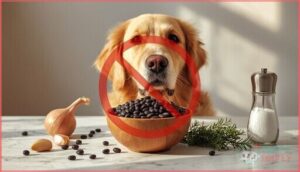This site is supported by our readers. We may earn a commission, at no cost to you, if you purchase through links.
Your dog spots a black bean on the kitchen floor and swallows it before you can react—sound familiar? Most pet owners have been there, and the frantic search that follows usually leads to conflicting answers.
The good news is that dogs can eat black beans safely, but preparation and portion size matter more than most people realize. Raw beans carry compounds that irritate the gut, while a pile of seasoned beans from last night’s burrito bowl brings its own set of problems.
Get those details right, and black beans can actually earn a small but useful place in your dog’s diet—offering protein, fiber, and a handful of vitamins that support everyday health.
Table Of Contents
- Key Takeaways
- Can Dogs Eat Black Beans Safely?
- Nutritional Benefits of Black Beans for Dogs
- Risks and Precautions When Feeding Black Beans
- How to Prepare Black Beans for Dogs
- Feeding Guidelines and Veterinary Advice
- Frequently Asked Questions (FAQs)
- Can you put black beans in homemade dog food?
- Are black beans good for dogs?
- Can eating black beans cause weight gain?
- How much black beans can a dog eat?
- Can dogs eat black beans and rice?
- Can dogs eat beans?
- Can black beans cause diarrhea in dogs?
- How often can dogs eat black beans?
- Do black beans help dogs digestion?
- Can puppies eat black beans safely?
- Conclusion
Key Takeaways
- Cooked plain black beans are safe for most dogs, but raw or seasoned ones can cause real harm, so preparation is the whole game.
- Keep portions small — under 10% of your dog’s daily calories — because the fiber and complex sugars can trigger gas, bloating, or loose stools if you overdo it.
- Dogs with kidney disease, diabetes, heart conditions, or legume allergies should skip black beans entirely, since the risks outweigh the nutritional perks.
- Black beans bring genuine benefits — plant protein, fiber, antioxidants, and key minerals — but they work best as an occasional add-on, not a staple.
Can Dogs Eat Black Beans Safely?
Yes, dogs can eat black beans — but a few things are worth knowing before you toss some in their bowl.
They’re actually packed with protein and fiber, which you can read more about in this guide to black beans and similar legumes safe for dogs.
Safety really comes down to preparation, portion size, and your dog’s individual health.
Here’s what to keep in mind.
Are Black Beans Toxic to Dogs?
Here’s the good news: cooked black beans aren’t toxic to dogs. Toxicity levels are low when they’re properly prepared, meaning no toxic compound from raw beans survives a full boil.
That said, canine digestion processes fiber and complex carbs differently than ours, so nutrient overload is a real concern. For overall black bean safety for dogs, think moderation — not a main course.
Including black beans’ health benefits can help you better understand their nutritional value for your dog.
Which Dogs Should Avoid Black Beans?
Not every dog tolerates black beans the same way. Some pups are better off skipping them entirely.
Dogs that should avoid black beans:
- Dogs with Digestive Sensitivities like pancreatitis or irritable bowel — canine digestive health can take a serious hit from fermentable fibers.
- Dogs with food allergies in dogs linked to legumes — Dog Allergies to peas or lentils often mean black beans trigger the same reaction.
- Dogs with Kidney Issues — beans raise phosphorus and add plant protein, which strains already compromised kidneys.
- Dogs with Metabolic Conditions like diabetes — the carb load can disrupt blood sugar balance.
- Dogs on Sodium Restrictions for heart disease — even rinsed canned beans can push sodium too high.
If your dog has any of these dog health issues, can dogs eat black beans safely? Probably not. For more on the importance of, refer to expert advice before adding black beans to your dog’s diet.
How Much Black Bean is Safe for Dogs?
Portion control guidelines are straightforward once you know your dog’s size. Extra small dogs should start with less than a teaspoon of cooked black beans, while large dogs can handle a tablespoon or two.
Daily intake limits cap beans at under 10% of total calories. When introducing new foods to dogs, start small, watch for digestive tolerance, and adjust from there.
Nutritional Benefits of Black Beans for Dogs
Black beans aren’t just a filler — they actually bring some solid nutrition to the table for your dog. Think of them as a small but mighty addition when used the right way.
They’re packed with protein, fiber, potassium, and iron — making black beans a surprisingly wholesome treat for dogs when served plain and in moderation.
Here’s what makes them worth considering.
Plant-Based Protein Content
Black beans aren’t a powerhouse protein like chicken or salmon, but they hold their own for a plant source. One cup of cooked black beans delivers around 15 grams of protein, including key amino acids like lysine and leucine.
As dietary supplements in canine nutrition, legumes for dogs offer real nutrient balance — just keep animal protein as the foundation.
Fiber for Digestive Health
Fiber does a lot of quiet work in your dog’s gut. Black beans offer both soluble and insoluble dietary fiber, which together support digestive balance in three key ways:
- Firmer stools through improved stool quality
- Better gut health via microbiome-feeding fermentable fiber
- Steadier canine digestive health by regulating transit time
Watch fiber intake carefully — too much disrupts fiber tolerance fast.
Essential Vitamins and Minerals
Think of black beans as a small but mighty addition to canine nutrition. They supply vitamin C, vitamin K, calcium, potassium, and manganese — nutrients that support vitamin balance and mineral absorption across your dog’s body.
A 100g serving even offers around 171mg of magnesium. That said, black beans shouldn’t replace dietary supplements or complete dog food, since nutrient deficiency risks rise when treats crowd out balanced meals.
Antioxidants and Immune Support
One of the quieter canine health benefits black beans offer is antioxidant protection. Their dark skins are rich in anthocyanins, flavonoids, and polyphenols — compounds that reduce oxidative stress and support cellular protection at the tissue level.
This matters for immunity because less oxidative damage means immune cells work more efficiently. Their fiber also feeds good gut bacteria, which ties digestive health directly to a stronger immune system.
Risks and Precautions When Feeding Black Beans
Black beans have a lot going for them, but they’re not without some caveats. Like most good things, too much — or the wrong kind — can cause real problems for your dog.
Here’s what to watch out for before you start adding them to the bowl.
Digestive Upset (Gas, Bloating, Diarrhea)
The biggest culprit behind dog digestive issues with black beans? Complex sugars called oligosaccharides that your dog’s digestive enzymes simply can’t break down. That gap in digestion hits canine digestive health hard — gut bacteria ferment those sugars, causing gas, bloating, and loose stools.
Black beans contain oligosaccharides that dogs cannot digest, leaving gut bacteria to ferment them into gas and bloating
For gas relief, just reduce the portion. Diarrhea prevention is straightforward too: introduce beans slowly, keeping gastrointestinal health stable through gradual gut health adjustments.
Potential Allergic Reactions
Black beans don’t suit every dog. Some develop allergy symptoms like itchy skin, hives, or facial swelling — classic signs of canine hypersensitivity.
Food intolerance shows up differently than a true allergy, but both affect gastrointestinal health. Skin reactions and vomiting together signal something more than a sensitive stomach.
In rare cases, anaphylaxis risk is real. Dogs with existing food allergies and sensitivities warrant extra caution here.
Weight Gain and Caloric Considerations
Calories add up faster than you’d think. Black beans pack about 132 calories per 100 grams — manageable in small amounts, but easy to overfeed.
For dog nutrition and weight management, keep black beans within the 10 percent daily allowance rule. A 10-pound dog only gets 30 to 40 treat calories daily, so portion control directly aids healthy dog food balance and overall canine dietary needs.
Raw and Canned Black Bean Hazards
Raw beans are a different problem than calorie overload. Raw black beans contain lectins — proteins that survive digestion and cause real digestive irritation, even vomiting.
Raw bean risks don’t stop there; phytic acid binds minerals your dog can’t then absorb. Canned black beans bring canned bean dangers like sodium and hidden garlic, which threatens canine digestive health. Always cook beans plain.
How to Prepare Black Beans for Dogs
Getting the prep right makes all the difference in terms of sharing black beans with your dog. A few simple steps can turn this healthy legume into a safe, dog-friendly treat.
Here’s what you need to know before you serve them up.
Cooking Methods for Safety
There are three solid ways to prepare cooked black beans safely for your dog’s health and nutrition.
- Soak first — Use soaking techniques overnight (8–12 hours) to soften beans and reduce gut-irritating sugars.
- Boil thoroughly — Boiling times of 35 minutes to 2 hours neutralize lectins.
- Pressure cook — Faster and effective for canine digestive health.
- Check bean texture — Beans should mash easily before serving.
Avoiding Salt, Seasonings, and Additives
Once your beans are cooked, keep them plain black beans — no exceptions. Salt, garlic, onion powder, and spice blends are all off the table for dog health and nutrition.
Garlic alone can damage red blood cells, and even small amounts of seasoning dangers add up fast. Safe preparation means serving plain black beans with zero additives, protecting canine digestive health every time.
Rinsing Canned Black Beans
If you’re using canned black beans, rinsing them is a simple step that makes a real difference. Pour them into a colander, rinse under cool water for about 30 seconds, and drain well.
This cuts surface sodium by roughly 40 percent and washes away the starchy brine that can cause gas. Core nutrients like protein stay intact, so nutrient retention isn’t a concern.
Proper Portion Sizes
Portion sizes matter more than most owners realize. For daily feeding limits, think small portions: under a teaspoon for tiny dogs, one to two tablespoons for large breeds.
Black beans should never exceed 10 percent of your dog’s daily calories — that’s about 14 calories per tablespoon. Proper food proportioning keeps dog health and nutrition on track, so treat feeding black beans to dogs like adding a garnish, not a side dish.
Feeding Guidelines and Veterinary Advice
Knowing black beans are safe is one thing — knowing how to feed them wisely is another.
A little structure goes a long way when you’re adding something new to your dog’s bowl.
Here’s what to keep in mind.
Introducing Black Beans to Your Dog’s Diet
Slow and steady wins the race when feeding black beans to dogs. Think of it like a test drive before committing to a new route in pet meal planning.
Start here:
- Mix one tablespoon into your dog’s regular food for small dogs, two to three for larger breeds.
- Offer it once, then wait 24 hours before trying again.
- Keep black beans under 10% of daily calories.
Monitoring for Adverse Reactions
Once your dog tries black beans, watch closely for the next 24 hours. Reaction timing matters — digestive issues like gas, loose stool, or bloating usually show up within hours.
For symptom tracking, jot down what your dog ate and any changes in energy or bathroom habits. These simple notes support better veterinary guidance if allergy signs, a key concern in canine digestive health, appear later.
Special Considerations for Sensitive Dogs
Some dogs just have a more delicate system — and that’s okay. If your dog shows food intolerance signs like loose stool, itching, or low energy after trying black beans, they may need a canine nutrition plan built around gentler options.
Green beans or peas are kinder alternatives. Sensitive stomach care means listening to your dog’s body and adjusting before small issues become bigger ones.
When to Consult Your Veterinarian
Most questions about black beans can wait for a routine visit, but some can’t. Call your vet right away if your dog shows emergency signs like a swollen belly, repeated vomiting, or difficulty breathing.
For ongoing health monitoring after dietary changes, talking to a vet online is a convenient option. Pet safety comes first — when in doubt, just ask.
Frequently Asked Questions (FAQs)
Can you put black beans in homemade dog food?
Yes, you can add black beans to homemade dog food. They work well as a plant-based protein and fiber boost, supporting canine wellness — just keep portions small and preparation simple.
Are black beans good for dogs?
Black beans pack a surprising nutritional punch for your pup. As a pet food alternative, they offer real dog nutrition benefits — plant protein, fiber for canine digestive health, and key minerals that support dog health and wellness.
Can eating black beans cause weight gain?
They can, if you’re not careful. Black beans add calories to your dog’s canine diet, so portion control matters.
Their fiber content aids weight management, but balance them with regular dog food and nutrition for best results.
How much black beans can a dog eat?
The sweet spot sits around 10 percent of your dog’s daily caloric intake. Small dogs do well with one teaspoon; larger breeds can handle one to two tablespoons.
Can dogs eat black beans and rice?
Plain cooked black beans and rice can be a safe, occasional treat for most healthy dogs. Think of it as a simple side dish — no seasoning, no extras, just easy dog meal planning done right.
Can dogs eat beans?
Yes, dogs can eat beans as an occasional treat.
In terms of canine nutrition and dog meal planning, beans offer fiber and plant protein — just keep portions small and preparation simple.
Can black beans cause diarrhea in dogs?
Black beans can cause diarrhea in dogs, mainly due to their high fiber content and complex sugars that are tough on canine gut health.
Moderation and slow introduction help protect stool quality and overall dog digestive health.
How often can dogs eat black beans?
Funny enough, moderation is the whole secret here. For most healthy dogs, feeding black beans two to three times per week — in small portions — keeps canine nutrition balanced without taxing dog digestive health.
Do black beans help dogs digestion?
In small amounts, black beans can support your dog’s digestive health. The fiber benefits include better stool consistency and a healthier gut microbiome.
Though digestive adaptation takes time, so always start slow.
Can puppies eat black beans safely?
Plain, fully cooked black beans are generally safe for healthy puppies in tiny amounts. For puppy safety and canine digestion, keep portions under one teaspoon and always watch for reactions.
Conclusion
Picture a dog owner who starts adding a spoonful of plain, cooked black beans to their dog’s bowl twice a week—and notices firmer stools and steadier energy within the month. That’s not magic; that’s fiber and protein doing quiet, consistent work.
When you ask can dogs eat black beans, the honest answer is yes, with care. Cook them plain, keep portions small, and your dog gets a simple, wholesome addition worth keeping around.
- https://wagwalking.com/sense/can-dogs-taste-black-beans
- https://www.petful.com/food/can-dogs-eat-black-beans/
- https://nativepet.com/blogs/health/can-dogs-eat-beans
- https://souldogsynergy.com/the-sweet-spot-treating-your-dog-right-with-the-10-rule/
- https://www.eatthismuch.com/calories/black-beans-3513?a=0.5813953488372093%3A0














